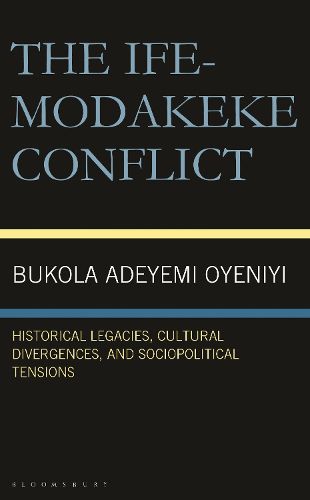Readings Newsletter
Become a Readings Member to make your shopping experience even easier.
Sign in or sign up for free!
You’re not far away from qualifying for FREE standard shipping within Australia
You’ve qualified for FREE standard shipping within Australia
The cart is loading…






Bukola Adeyemi Oyeniyi examines the complex interplay of history, culture, and politics that have shaped the longstanding conflict between the Ife and Modakeke communities in Nigeria.
This book argues that the roots of this conflict extend beyond immediate sociopolitical grievances and are deeply entwined with historical legacies and cultural divergences that have evolved over centuries. Using archival materials, oral histories, and contemporary narratives, Oyeniyi illustrates how colonial legacies, ethnic identities, and local power dynamics have contributed to ongoing tensions. The analysis reveals how historical grievances are often reframed in contemporary contexts, influencing community relations and political alignments. Ultimately, this book sheds light on the necessity of understanding historical contexts to address current conflicts, offering insights into conflict resolution and peacebuilding strategies that are informed by a nuanced grasp of local histories and cultural identities. This book contributes significantly to the broader discourse on conflict in Nigeria and Africa, emphasizing the importance of historical awareness in contemporary sociopolitical landscapes.
$9.00 standard shipping within Australia
FREE standard shipping within Australia for orders over $100.00
Express & International shipping calculated at checkout
Bukola Adeyemi Oyeniyi examines the complex interplay of history, culture, and politics that have shaped the longstanding conflict between the Ife and Modakeke communities in Nigeria.
This book argues that the roots of this conflict extend beyond immediate sociopolitical grievances and are deeply entwined with historical legacies and cultural divergences that have evolved over centuries. Using archival materials, oral histories, and contemporary narratives, Oyeniyi illustrates how colonial legacies, ethnic identities, and local power dynamics have contributed to ongoing tensions. The analysis reveals how historical grievances are often reframed in contemporary contexts, influencing community relations and political alignments. Ultimately, this book sheds light on the necessity of understanding historical contexts to address current conflicts, offering insights into conflict resolution and peacebuilding strategies that are informed by a nuanced grasp of local histories and cultural identities. This book contributes significantly to the broader discourse on conflict in Nigeria and Africa, emphasizing the importance of historical awareness in contemporary sociopolitical landscapes.